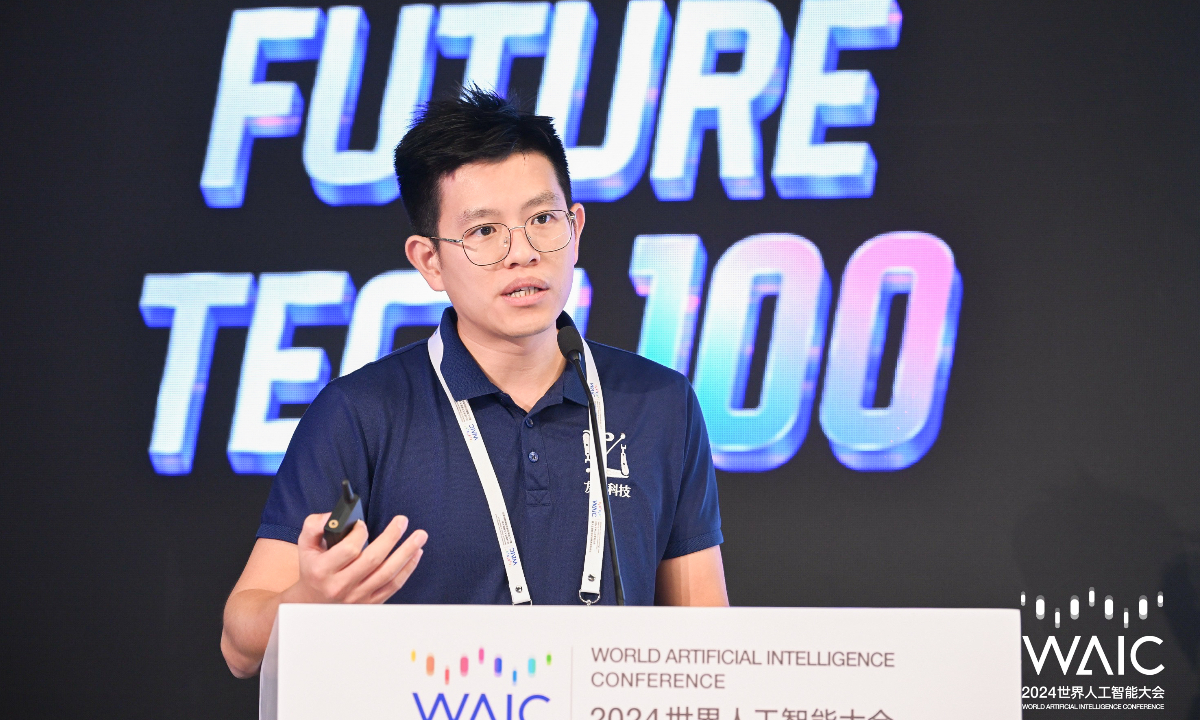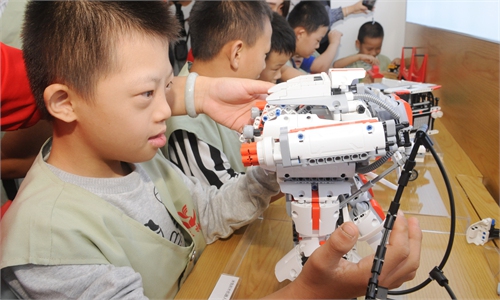IN-DEPTH / IN-DEPTH
AI boom in mainland offers more opportunities to Hong Kong youth, fosters 'Greater Bay citizen'
New generation

Parker Li delivers a speech at the WAIC on July 6, 2024 after being selected as one of the Future Tech 100. Photo: Courtesy of Li
Hong Kong youth Parker Li calls himself a "real Greater Bay citizen" as his father was among the first entrepreneurs who came from Hong Kong to Zhongshan, South China's Guangdong Province, in the 1980s to start businesses and his mother was a Zhongshan native.
The smile on his face, when the Global Times spoke with him during the World AI Conference (WAIC) in Shanghai in early July, showed his high recognition of this identity and his confidence in the development of the Guangdong-Hong Kong-Macao Greater Bay Area.
Li, 32, chose to come back to Zhongshan to realize his robotics dream after obtaining a graduate degree in mechanical and automation engineering at the Chinese University of Hong Kong in 2016.
"I really like the entrepreneurial atmosphere in Zhongshan. In the city, young entrepreneurs from Hong Kong and Macao can enjoy many preferential and supportive policies. Mentors at the entrepreneurial incubation base also provide us with guidance to help us grow," he said.
The broad market and the rapid development of artificial intelligence (AI) in the mainland has also brought about unlimited opportunities for young entrepreneurs.
At first, Li provided customized services to factories to help them customize a complete set of robots for an intelligent manufacturing transformation.
However, it did not take a long time for Li to discover a major pain point in this process - an industrial robot production line can only produce a single type of product, but the factories need to update their products frequently.
"Large-scale enterprises cannot just produce a single product forever. The product update and iteration speed in some manufacturing factories is very fast, and this means that a style of robot they customized may only be used for a few months, which is very uneconomical," Li said.
But what if factories could master the skills of robot programming themselves and update robot programs on their own according to production needs? With this idea, Li began to study the software development of industrial robot cloud programming and founded his company in 2021.
Three years later, the robotics operating system his team developed has been applied in many factories and helped them cut cost of introducing robotic equipment by about 60 percent.
According to Li, the system his team developed is very easy to learn - an ordinary worker can learn how to operate it within 15 minutes - and the system can also be adjusted to adapt to the assembly line within 10 minutes.
Teach the robot to do it once, and then the robot will continue to repeat it. This means that workers can be freed from tedious repetitive work for more meaningful things, Li told the Global Times.
Directly bringing robot applications to the factory floor and reducing factory costs, his company Youtoo's operation has been included in the top 100 industrial APPs by the Chinese Ministry of Industry and Information Technology for two consecutive years, according to media reports.
This year, Li's system was also selected as one of the WAIC 2024 Future Tech 100, which is especially set for the first time to commend the innovative foresight, growth potential, and commercial value of relevant solutions.
Among the tech companies coming to the WAIC under the organization of the Hong Kong Science and Technology Park, Metapool Technology is another that attracted a lot of attention with the magnificent Tiangong space station on their screens.
According to the company staff, their product is the world's first metaverse interactive teaching tool themed on the Chinese Tiangong space station. It uses advanced technology to simulate experiences, allowing users to experience interactive learning inside and outside the Tiangong cabin, which includes roaming, operating equipment, conducting space experiments, space sports and entertainment inside the space station, as well as roaming, operating the robotic arm, and conducting external observations outside the space station.
Gathering youth and expertise from both the mainland and Hong Kong, the company staff told the Global Times that they believed their product is not only a fruit of the integration of the Greater Bay Area, but would also help promote aerospace education in the area and cultivate the next generation of talents.
The Greater Bay Area has become one of the most open and economically vibrant regions in China, as well as one of the most dynamic growth engines for the world. With the global trend of AI, both the central government and Greater Bay Area regional authorities are actively taking steps to drive high-quality development in Guangdong, Hong Kong, and Macao.
A supercomputing center in the HKSTP in Tseung Kwan O is expected to start operation in the second half of this year. The center is projected to provide computing power of three trillion floating-point operations per second by early 2026, equivalent to processing nearly 10 billion images in one hour. It is expected to help promote development in the Greater Bay Area and consolidate Hong Kong's position as an international science and innovation hub, according to local media reports.
The mainland has a vast market and many opportunities while Hong Kong has more mature experiences in entrepreneurial guidance and resource integration. In the era of AI, more and more "Greater Bay citizens" like Li are deemed to benefit from both sides with the development of the Greater Bay Area and then, in return, contribute to the prosperity of the area with their wisdom and inventions.


